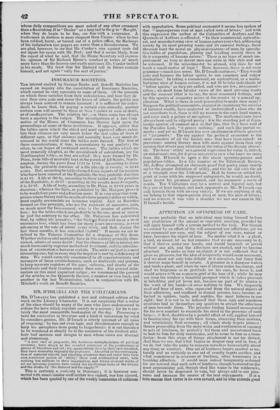MR. DISRAELI AND THE UTILITARIANS.
MR. DISRAELI has published a new and enlarged edition of his work on the Literary Character. It is not surprising that a writer of his class should be angry at the men who have endeavoured to reduce the laws which regulate society to a science ; for he is cer- tainly the most unscientific bookmaker of the day. Possessing a taste for curiosities in literature and a kind of veneration for what he considers genius, Mr. Disraeli is utterly ignorant of all rules of reasoning : lie has not even logic and discrimination enough to keep his metaphors from going to loggerheads: it is not therefore to be wondered at should he in the confusion of his intellect attri• bute had motives and designs to men whose views are abstract arid elementary. "A new race of jargonists, the barbarous metaphysicians of political economy, have struck at the essential existence of the productions of genius in literature and art ; for, appreciating them by their own standard, they have miserably degraded the professors. Absorbed in the contempla- tion of material objects, and rejecting whatever does not enter into their own restricted notion of ' utility,' these cold arithmetical seers, with nothing but millions in their imagination, and whose choicest works of art are spinning-jennies, have valued the intellectual tasks of the library and the studio by the demand and the supply."
This is certainly a curiosity in literature ; it is however con- nected with much similar stuff neither less violent, nor less absurd,
winch has been quoted by one of the weekly luminaries of criticism with approbation. Some political economist it seems has spoken of that " unprosperous race of men called men of letters," and with this expression the author of the Calamities of Authors aad the Quarrels of Authors is offended. "In their commercial, agricultu- ral, and manufacturing view of human nature (says he), addressing society by its most pressing wants and its coarsest feelings, these theorists limit the moral an physical existence of man, by specula- tive tables of population, planing and levelling society down in their carpentry of human nature." There is no hope of much im- provement as long as decent men can write in this style and not be ashamed. If the schoolmaster be abroad, why does he not teach a small matter of logic ? Here, however, there is not even grammar—much less sense. Mr. Disraeli continues, "They would yoke and harness the loftier spirits to one common and vulgar destination." In taking a commercial, an agricultural, or a manu- facturing view of human nature, it is not fit to take individuals of "loftier spirits," as they are called, and who are few, into conside- ration ; we must form tabular views of the most pressing wants and the coarsest (that is to say, the most common) feelings, and by this species of carpentry arrive at the results of a general ap- plication. What is there in such proceeding to make men angry ? Suppose the political economists, engaged in examining the sources of national wealth, have neglected or undervalued a class who do not contribute to it, there is still no reason to rise such hard names, and raise such a pother of melaphors. The mathematicians have always been said to vilipend poetry : it is the standing jest at Cam- bridge against all eminent men in that line, that thy have said of the Paradise Lost, " it proves nothing," and such like partial re- marks ; and yet no Disraeli has ever -anathematized these greatest of " jargonists." The cry against the political economist is the most senseless of all the foolish ones that have been raised: its prevalence among literary men tells more against them than any opinion that others may entertain of the value of the literary charac- ter. The term ' utility' as a general expression for value is, indeed, an unfortunate one, for it gives occasion to men who know no more than Mr. Disraeli to open a fire about spinning-jennies and population-lables. In a late number of the Edinburgh Review, Mr. Jeffrey attempted an elaborate proof that poetry came strictly under the proper definition of utility, and-this he did with the air of a triumph over the Utilitarians. Had he however settled the point at issue with his supposed antagonists, he would, no doubt, have found his premises granted, and his argument a waste of words. The Utilitarians may be a narrow and bigoted sect, but they are at least logical, and such opponents as Mr. Disraeli can only furnish them with an easy victory. If we are anything at all, we belong to that unprosperous class of men, the men of letters ; and we confess it was with a shudder we saw our cause in Mr. D'Israeli's hands.


















 Previous page
Previous page